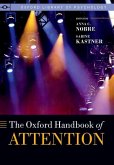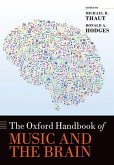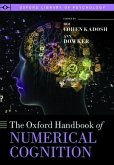Oxford Handbook of Chinese Psychology
Herausgeber: Harris Bond, Michael
Oxford Handbook of Chinese Psychology
Herausgeber: Harris Bond, Michael
- Broschiertes Buch
- Merkliste
- Auf die Merkliste
- Bewerten Bewerten
- Teilen
- Produkt teilen
- Produkterinnerung
- Produkterinnerung
With China's recent phenomenal growth, there is great interest in understanding the psychological and social processes that characterize the Chinese people. This book is the first of its kind - a comprehensive and commanding review of Chinese psychology, covering areas of human functioning with unparalleled sophistication and complexity.
Andere Kunden interessierten sich auch für
![The Oxford Handbook of Attention The Oxford Handbook of Attention]() The Oxford Handbook of Attention73,99 €
The Oxford Handbook of Attention73,99 €![The Oxford Handbook of Music and the Brain The Oxford Handbook of Music and the Brain]() The Oxford Handbook of Music and the Brain68,99 €
The Oxford Handbook of Music and the Brain68,99 €![The Oxford Handbook of Numerical Cognition The Oxford Handbook of Numerical Cognition]() The Oxford Handbook of Numerical Cognition95,99 €
The Oxford Handbook of Numerical Cognition95,99 €![The Oxford Handbook of Music Psychology The Oxford Handbook of Music Psychology]() The Oxford Handbook of Music Psychology61,99 €
The Oxford Handbook of Music Psychology61,99 €![The Oxford Handbook of Positive Psychology The Oxford Handbook of Positive Psychology]() The Oxford Handbook of Positive Psychology206,99 €
The Oxford Handbook of Positive Psychology206,99 €![The Oxford Handbook of Cyberpsychology The Oxford Handbook of Cyberpsychology]() The Oxford Handbook of Cyberpsychology68,99 €
The Oxford Handbook of Cyberpsychology68,99 €![Oxford Handbook of Job Loss and Job Search Oxford Handbook of Job Loss and Job Search]() Oxford Handbook of Job Loss and Job Search206,99 €
Oxford Handbook of Job Loss and Job Search206,99 €-
-
-
With China's recent phenomenal growth, there is great interest in understanding the psychological and social processes that characterize the Chinese people. This book is the first of its kind - a comprehensive and commanding review of Chinese psychology, covering areas of human functioning with unparalleled sophistication and complexity.
Hinweis: Dieser Artikel kann nur an eine deutsche Lieferadresse ausgeliefert werden.
Hinweis: Dieser Artikel kann nur an eine deutsche Lieferadresse ausgeliefert werden.
Produktdetails
- Produktdetails
- Oxford Library of Psychology
- Verlag: Oxford University Press
- Seitenzahl: 752
- Erscheinungstermin: 5. Mai 2015
- Englisch
- Abmessung: 244mm x 169mm x 40mm
- Gewicht: 1276g
- ISBN-13: 9780198738572
- ISBN-10: 0198738579
- Artikelnr.: 47865662
- Herstellerkennzeichnung
- Libri GmbH
- Europaallee 1
- 36244 Bad Hersfeld
- gpsr@libri.de
- Oxford Library of Psychology
- Verlag: Oxford University Press
- Seitenzahl: 752
- Erscheinungstermin: 5. Mai 2015
- Englisch
- Abmessung: 244mm x 169mm x 40mm
- Gewicht: 1276g
- ISBN-13: 9780198738572
- ISBN-10: 0198738579
- Artikelnr.: 47865662
- Herstellerkennzeichnung
- Libri GmbH
- Europaallee 1
- 36244 Bad Hersfeld
- gpsr@libri.de
Michael Harris Bond completed his undergraduate training in honours psychology at the University of Toronto (1966), before venturing to Stanford University where he gained a PhD in social psychology (1970). Following a post-doctoral fellowship in experimental social innovation at Michigan State University, he travelled to Japan as his wife's dependent in 1971. While she taught English, he worked as a Research Associate at Kwansei Gakuin University, studying non-verbal behaviour and beginning his first cross-cultural studies. These continued for the next 35 years, focusing on Chinese social behaviour during his first, full-time academic position at the Chinese University of Hong Kong. He moved to the Hong Kong Polytechnic University in 2009 where he is now Chair Professor of Applied Social Sciences.
* 1: Geoffrey Blowers: The continuing prospects for Chinese psychology
* 2: Ying-Yi Hong, Yung-Jui Yang, and Chi-Yue Chiu: What is Chinese
about Chinese psychology and who are the Chinese in Chinese
psychology?
* 3: Farhan Ali and Trevor Penney: The cultured brain: Interplay of
genes, brain, and culture
* 4: Xin-Yin Chen: Social and emotional development in Chinese children
* 5: Qian Wang and Lei Chang: Parenting and child socialization in
contemporary China
* 6: Ping Li and Hua Shu: Language and the brain: Computational and
neuroanatomical perspectives from Chinese
* 7: Catherine McBride-Chang, Dan Lin, Yui-Chi Fong, and Hua Shu:
Language and literacy development in Chinese children
* 8: Connie Suk-Han Ho: Understanding reading disabilities in
Chinese: From basic research to intervention
* 9: Him Cheung, Fong-Ha Yap and Virginia Yip: Chinese bilingualism
* 10: Yu-Jing Ni, Ming Ming Chiu and Zi Juan Cheng: Chinese children
learning mathematics: From home to school.
* 11: Li-Jun Ji, Albert Lee, and Tieyuan Guo: The thinking styles of
Chinese people
* 12: David Kember and David Watkins: Approaches to learning and
teaching by the Chinese
* 13: K-T Hau and Irene T. Ho: Chinese students' motivation and
achievement
* 14: Michelle Yik: How unique is Chinese emotion
* 15: Kwok Leung: Beliefs in Chinese societies
* 16: Steve J. Kulich and Rui Zhang: The multiple frames of 'Chinese'
values: From tradition to modernity and beyond
* 17: Virginia S.-Y. Kwan and James A. McGee: What do we know about the
Chinese self? Illustrations with self-esteem, self-efficacy, and
self-enhancement
* 18: Fanny M. Cheung, Shu-Fai Cheung and Jianxin Zhang: From
indigenous to cross-cultural personality: The case of the Chinese
Personality Assessment Inventory
* 19: Helene H. Fung and Sheung-Tak Cheng: Psychology and aging in the
Land of the Panda
* 20: Luo Lu: Chinese well-being
* 21: Daniel Shek: The spirituality of the Chinese people: A critical
review
* 22: Sunita Mahtani Stewart, Peter W.-H. Lee, and Rongrong Tao:
Psychiatric disorders in the Chinese
* 23: Agnes S.-Y. Chan, Winnie W. Leung, and Mei-Chun Cheung: Clinical
neuropsychology in China
* 24: Cecilia Cheng, Barbara C. Y. Lo, and Jasmine H. M. Chio: The tao
(way) of Chinese coping
* 25: Winnie W.-S. Mak and Sylvia Xiaohua Chen: Illness behaviors among
the Chinese
* 26: Charles C. Chan: Community psychology in Chinese societies
* 27: Wai-Sum Liu and Patrick W.-L. Leung: Psychotherapy with the
Chinese: An update of the work in the last decade
* 28: Kwang-Kuo Hwang and Kuei-Hsiang Han: Face and morality in
Confucian society
* 29: Hildie Leung and Winton W.-T. Au: Chinese cooperation and
competition
* 30: Darius K.-S. Chan, Theresa Ng, and Chin-Ming Hui: Interpersonal
relationships in rapidly changing Chinese societies
* 31: Catherine So-kum Tang, Zhiren Chua, and Jiaqing O: A gender
perspective on Chinese social relationships and behavior
* 32: Xu Shi and Bing Feng: Chinese cultural psychology and
contemporary communication
* 33: Isabel Wing-Chun Ng: Chinese political psychology: Political
participation in Chinese societies
* 34: James Liu, Mei-Chih Li, and Xiao-Dong Yue: Chinese intergroup
relations and social identity
* 35: Chao C. Chen and Jiing-Lih Farh: Developments in Chinese
leadership: Paternalism and its elaborations, moderations, and
alternatives
* 36: Robert S. Wyer, Jr. and Jiewen Hong: Chinese consumer behavior:
The effects of content, process and language
* 37: Gang-Yan Si, Hing-Chu Lee, and Chris Lonsdale: Chinese sports
psychology
* 38: Colleen Ward and En-Yi Lin: Chinese acculturation and adaptation
* 39: Inter-cultural interactions: The Chinese context: David C. Thomas
and Yuan Liao
* 40: On the distinctiveness of Chinese psychology: Or, are we all
Chinese?: Peter B. Smith
* 2: Ying-Yi Hong, Yung-Jui Yang, and Chi-Yue Chiu: What is Chinese
about Chinese psychology and who are the Chinese in Chinese
psychology?
* 3: Farhan Ali and Trevor Penney: The cultured brain: Interplay of
genes, brain, and culture
* 4: Xin-Yin Chen: Social and emotional development in Chinese children
* 5: Qian Wang and Lei Chang: Parenting and child socialization in
contemporary China
* 6: Ping Li and Hua Shu: Language and the brain: Computational and
neuroanatomical perspectives from Chinese
* 7: Catherine McBride-Chang, Dan Lin, Yui-Chi Fong, and Hua Shu:
Language and literacy development in Chinese children
* 8: Connie Suk-Han Ho: Understanding reading disabilities in
Chinese: From basic research to intervention
* 9: Him Cheung, Fong-Ha Yap and Virginia Yip: Chinese bilingualism
* 10: Yu-Jing Ni, Ming Ming Chiu and Zi Juan Cheng: Chinese children
learning mathematics: From home to school.
* 11: Li-Jun Ji, Albert Lee, and Tieyuan Guo: The thinking styles of
Chinese people
* 12: David Kember and David Watkins: Approaches to learning and
teaching by the Chinese
* 13: K-T Hau and Irene T. Ho: Chinese students' motivation and
achievement
* 14: Michelle Yik: How unique is Chinese emotion
* 15: Kwok Leung: Beliefs in Chinese societies
* 16: Steve J. Kulich and Rui Zhang: The multiple frames of 'Chinese'
values: From tradition to modernity and beyond
* 17: Virginia S.-Y. Kwan and James A. McGee: What do we know about the
Chinese self? Illustrations with self-esteem, self-efficacy, and
self-enhancement
* 18: Fanny M. Cheung, Shu-Fai Cheung and Jianxin Zhang: From
indigenous to cross-cultural personality: The case of the Chinese
Personality Assessment Inventory
* 19: Helene H. Fung and Sheung-Tak Cheng: Psychology and aging in the
Land of the Panda
* 20: Luo Lu: Chinese well-being
* 21: Daniel Shek: The spirituality of the Chinese people: A critical
review
* 22: Sunita Mahtani Stewart, Peter W.-H. Lee, and Rongrong Tao:
Psychiatric disorders in the Chinese
* 23: Agnes S.-Y. Chan, Winnie W. Leung, and Mei-Chun Cheung: Clinical
neuropsychology in China
* 24: Cecilia Cheng, Barbara C. Y. Lo, and Jasmine H. M. Chio: The tao
(way) of Chinese coping
* 25: Winnie W.-S. Mak and Sylvia Xiaohua Chen: Illness behaviors among
the Chinese
* 26: Charles C. Chan: Community psychology in Chinese societies
* 27: Wai-Sum Liu and Patrick W.-L. Leung: Psychotherapy with the
Chinese: An update of the work in the last decade
* 28: Kwang-Kuo Hwang and Kuei-Hsiang Han: Face and morality in
Confucian society
* 29: Hildie Leung and Winton W.-T. Au: Chinese cooperation and
competition
* 30: Darius K.-S. Chan, Theresa Ng, and Chin-Ming Hui: Interpersonal
relationships in rapidly changing Chinese societies
* 31: Catherine So-kum Tang, Zhiren Chua, and Jiaqing O: A gender
perspective on Chinese social relationships and behavior
* 32: Xu Shi and Bing Feng: Chinese cultural psychology and
contemporary communication
* 33: Isabel Wing-Chun Ng: Chinese political psychology: Political
participation in Chinese societies
* 34: James Liu, Mei-Chih Li, and Xiao-Dong Yue: Chinese intergroup
relations and social identity
* 35: Chao C. Chen and Jiing-Lih Farh: Developments in Chinese
leadership: Paternalism and its elaborations, moderations, and
alternatives
* 36: Robert S. Wyer, Jr. and Jiewen Hong: Chinese consumer behavior:
The effects of content, process and language
* 37: Gang-Yan Si, Hing-Chu Lee, and Chris Lonsdale: Chinese sports
psychology
* 38: Colleen Ward and En-Yi Lin: Chinese acculturation and adaptation
* 39: Inter-cultural interactions: The Chinese context: David C. Thomas
and Yuan Liao
* 40: On the distinctiveness of Chinese psychology: Or, are we all
Chinese?: Peter B. Smith
* 1: Geoffrey Blowers: The continuing prospects for Chinese psychology
* 2: Ying-Yi Hong, Yung-Jui Yang, and Chi-Yue Chiu: What is Chinese
about Chinese psychology and who are the Chinese in Chinese
psychology?
* 3: Farhan Ali and Trevor Penney: The cultured brain: Interplay of
genes, brain, and culture
* 4: Xin-Yin Chen: Social and emotional development in Chinese children
* 5: Qian Wang and Lei Chang: Parenting and child socialization in
contemporary China
* 6: Ping Li and Hua Shu: Language and the brain: Computational and
neuroanatomical perspectives from Chinese
* 7: Catherine McBride-Chang, Dan Lin, Yui-Chi Fong, and Hua Shu:
Language and literacy development in Chinese children
* 8: Connie Suk-Han Ho: Understanding reading disabilities in
Chinese: From basic research to intervention
* 9: Him Cheung, Fong-Ha Yap and Virginia Yip: Chinese bilingualism
* 10: Yu-Jing Ni, Ming Ming Chiu and Zi Juan Cheng: Chinese children
learning mathematics: From home to school.
* 11: Li-Jun Ji, Albert Lee, and Tieyuan Guo: The thinking styles of
Chinese people
* 12: David Kember and David Watkins: Approaches to learning and
teaching by the Chinese
* 13: K-T Hau and Irene T. Ho: Chinese students' motivation and
achievement
* 14: Michelle Yik: How unique is Chinese emotion
* 15: Kwok Leung: Beliefs in Chinese societies
* 16: Steve J. Kulich and Rui Zhang: The multiple frames of 'Chinese'
values: From tradition to modernity and beyond
* 17: Virginia S.-Y. Kwan and James A. McGee: What do we know about the
Chinese self? Illustrations with self-esteem, self-efficacy, and
self-enhancement
* 18: Fanny M. Cheung, Shu-Fai Cheung and Jianxin Zhang: From
indigenous to cross-cultural personality: The case of the Chinese
Personality Assessment Inventory
* 19: Helene H. Fung and Sheung-Tak Cheng: Psychology and aging in the
Land of the Panda
* 20: Luo Lu: Chinese well-being
* 21: Daniel Shek: The spirituality of the Chinese people: A critical
review
* 22: Sunita Mahtani Stewart, Peter W.-H. Lee, and Rongrong Tao:
Psychiatric disorders in the Chinese
* 23: Agnes S.-Y. Chan, Winnie W. Leung, and Mei-Chun Cheung: Clinical
neuropsychology in China
* 24: Cecilia Cheng, Barbara C. Y. Lo, and Jasmine H. M. Chio: The tao
(way) of Chinese coping
* 25: Winnie W.-S. Mak and Sylvia Xiaohua Chen: Illness behaviors among
the Chinese
* 26: Charles C. Chan: Community psychology in Chinese societies
* 27: Wai-Sum Liu and Patrick W.-L. Leung: Psychotherapy with the
Chinese: An update of the work in the last decade
* 28: Kwang-Kuo Hwang and Kuei-Hsiang Han: Face and morality in
Confucian society
* 29: Hildie Leung and Winton W.-T. Au: Chinese cooperation and
competition
* 30: Darius K.-S. Chan, Theresa Ng, and Chin-Ming Hui: Interpersonal
relationships in rapidly changing Chinese societies
* 31: Catherine So-kum Tang, Zhiren Chua, and Jiaqing O: A gender
perspective on Chinese social relationships and behavior
* 32: Xu Shi and Bing Feng: Chinese cultural psychology and
contemporary communication
* 33: Isabel Wing-Chun Ng: Chinese political psychology: Political
participation in Chinese societies
* 34: James Liu, Mei-Chih Li, and Xiao-Dong Yue: Chinese intergroup
relations and social identity
* 35: Chao C. Chen and Jiing-Lih Farh: Developments in Chinese
leadership: Paternalism and its elaborations, moderations, and
alternatives
* 36: Robert S. Wyer, Jr. and Jiewen Hong: Chinese consumer behavior:
The effects of content, process and language
* 37: Gang-Yan Si, Hing-Chu Lee, and Chris Lonsdale: Chinese sports
psychology
* 38: Colleen Ward and En-Yi Lin: Chinese acculturation and adaptation
* 39: Inter-cultural interactions: The Chinese context: David C. Thomas
and Yuan Liao
* 40: On the distinctiveness of Chinese psychology: Or, are we all
Chinese?: Peter B. Smith
* 2: Ying-Yi Hong, Yung-Jui Yang, and Chi-Yue Chiu: What is Chinese
about Chinese psychology and who are the Chinese in Chinese
psychology?
* 3: Farhan Ali and Trevor Penney: The cultured brain: Interplay of
genes, brain, and culture
* 4: Xin-Yin Chen: Social and emotional development in Chinese children
* 5: Qian Wang and Lei Chang: Parenting and child socialization in
contemporary China
* 6: Ping Li and Hua Shu: Language and the brain: Computational and
neuroanatomical perspectives from Chinese
* 7: Catherine McBride-Chang, Dan Lin, Yui-Chi Fong, and Hua Shu:
Language and literacy development in Chinese children
* 8: Connie Suk-Han Ho: Understanding reading disabilities in
Chinese: From basic research to intervention
* 9: Him Cheung, Fong-Ha Yap and Virginia Yip: Chinese bilingualism
* 10: Yu-Jing Ni, Ming Ming Chiu and Zi Juan Cheng: Chinese children
learning mathematics: From home to school.
* 11: Li-Jun Ji, Albert Lee, and Tieyuan Guo: The thinking styles of
Chinese people
* 12: David Kember and David Watkins: Approaches to learning and
teaching by the Chinese
* 13: K-T Hau and Irene T. Ho: Chinese students' motivation and
achievement
* 14: Michelle Yik: How unique is Chinese emotion
* 15: Kwok Leung: Beliefs in Chinese societies
* 16: Steve J. Kulich and Rui Zhang: The multiple frames of 'Chinese'
values: From tradition to modernity and beyond
* 17: Virginia S.-Y. Kwan and James A. McGee: What do we know about the
Chinese self? Illustrations with self-esteem, self-efficacy, and
self-enhancement
* 18: Fanny M. Cheung, Shu-Fai Cheung and Jianxin Zhang: From
indigenous to cross-cultural personality: The case of the Chinese
Personality Assessment Inventory
* 19: Helene H. Fung and Sheung-Tak Cheng: Psychology and aging in the
Land of the Panda
* 20: Luo Lu: Chinese well-being
* 21: Daniel Shek: The spirituality of the Chinese people: A critical
review
* 22: Sunita Mahtani Stewart, Peter W.-H. Lee, and Rongrong Tao:
Psychiatric disorders in the Chinese
* 23: Agnes S.-Y. Chan, Winnie W. Leung, and Mei-Chun Cheung: Clinical
neuropsychology in China
* 24: Cecilia Cheng, Barbara C. Y. Lo, and Jasmine H. M. Chio: The tao
(way) of Chinese coping
* 25: Winnie W.-S. Mak and Sylvia Xiaohua Chen: Illness behaviors among
the Chinese
* 26: Charles C. Chan: Community psychology in Chinese societies
* 27: Wai-Sum Liu and Patrick W.-L. Leung: Psychotherapy with the
Chinese: An update of the work in the last decade
* 28: Kwang-Kuo Hwang and Kuei-Hsiang Han: Face and morality in
Confucian society
* 29: Hildie Leung and Winton W.-T. Au: Chinese cooperation and
competition
* 30: Darius K.-S. Chan, Theresa Ng, and Chin-Ming Hui: Interpersonal
relationships in rapidly changing Chinese societies
* 31: Catherine So-kum Tang, Zhiren Chua, and Jiaqing O: A gender
perspective on Chinese social relationships and behavior
* 32: Xu Shi and Bing Feng: Chinese cultural psychology and
contemporary communication
* 33: Isabel Wing-Chun Ng: Chinese political psychology: Political
participation in Chinese societies
* 34: James Liu, Mei-Chih Li, and Xiao-Dong Yue: Chinese intergroup
relations and social identity
* 35: Chao C. Chen and Jiing-Lih Farh: Developments in Chinese
leadership: Paternalism and its elaborations, moderations, and
alternatives
* 36: Robert S. Wyer, Jr. and Jiewen Hong: Chinese consumer behavior:
The effects of content, process and language
* 37: Gang-Yan Si, Hing-Chu Lee, and Chris Lonsdale: Chinese sports
psychology
* 38: Colleen Ward and En-Yi Lin: Chinese acculturation and adaptation
* 39: Inter-cultural interactions: The Chinese context: David C. Thomas
and Yuan Liao
* 40: On the distinctiveness of Chinese psychology: Or, are we all
Chinese?: Peter B. Smith








